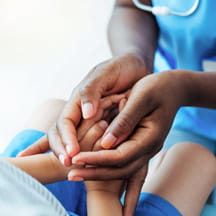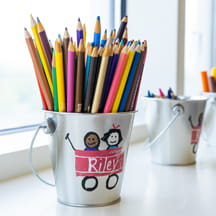Megan Nickels recalls the scene in the hospital room. It was “pure chaos.” The TV was blaring. Siblings were crowded in one corner loudly playing with toys. The patient’s mother was attempting to carry on a difficult phone conversation above the din. Doctors and nurses shuttled in and out of the room to check vitals and administer shots. In the middle of it all sat the patient—a 14-year-old girl who recently had a brain tumor removed. She was nauseous from the medication and crying.
And there stood Nickels. It was her first day as a volunteer teacher at OSF HealthCare Children’s Hospital of Illinois in Peoria. “I was holding this thick packet of worksheets—it must’ve been about 50 pages of equivalent fraction problems,” says Nickels, Ph.D., founder and faculty director of PedsAcademy at Nemours Children’s Hospital in Orlando, Florida. “In that moment, the ridiculousness of trying to engage this child in this work really just hit me. This was not going to be easy or even viable.”
Not surprisingly, the young girl wanted no part of that stack of homework. It was a theme that repeated itself all day long—patient after patient. Determined to reach these kids, Nickels returned to the hospital the next day. But this time without the huge homework packets. Instead, she brought educational toys and found success. That young girl even agreed to build a robot with Nickels.
“From there, I started researching specifically about children with various cancers and how I could address their needs,” Nickels says. “I knew then that this would be my life’s work.”
First-of-its-kind education model
Today, Nickels heads up PedsAcademy, a novel program developed jointly by Nemours and the University of Central Florida (UCF) in Orlando to deliver science, technology, engineering and math (STEM) curriculum to patients. Nemours says it’s the world’s first program to provide children in hospitals with research-backed, technology-based educational opportunities specific to a child’s disease or condition.
Nickels and her team developed teaching methods and educational tasks based on extensive research of how various diseases—and their treatments—can impact a child’s ability to learn due to cognitive and physical impairments. Using high-tech tools including immersive virtual reality, robotics and 3-D printers, PedsAcademy lessons are also personalized to each patient’s interests to heighten engagement.
Research, training key to program’s evolution
Since its launch more than a year ago, PedsAcademy has conducted about 40-60 patient lessons per day. Most lessons take place at the patient’s bedside, although there is a classroom at the hospital to accommodate group classes. Even siblings and children in outpatient treatment are welcome to participate.
The primary objective of PedsAcademy is to provide educational opportunities for sick children, but it continues to evolve behind two other focus areas:
Nickels and her team continue to pursue their objectives while expanding the breadth of the program at Nemours. Recent PedsAcademy additions include a science fair, a spelling bee and a musical theater presentation produced and performed entirely by students. She says these types of activities enhance the program’s mission to provide an exceptional educational experience while giving kids a taste of what they might be missing back at their regular school.
Bringing PedsAcademy to more children
While PedsAcademy expands at Nemours, the broader vison includes growth beyond the hospital’s walls. “I see huge potential—not only for Nemours Children’s Hospital but for all children’s hospitals,” says Terri Finkel, M.D., Ph.D., chair of pediatrics and chief scientific officer at Nemours Children’s Hospital. “Many children’s hospitals are associated in some way with a university or institution of higher education and likely a teaching college. It’s pretty evident that this program could readily be spread to all children’s hospitals.”
Nickels says strategic planning is underway to develop the PedsAcademy model so that it can be rolled out to other hospitals, and discussions are ongoing with several children’s hospitals to expand the program nationally.
“We need to be able to ensure for children everywhere that no matter their medical condition, we give them the educational opportunity that allows them to live a life they’ve chosen for themselves,” Nickels says. “That’s our goal.”


